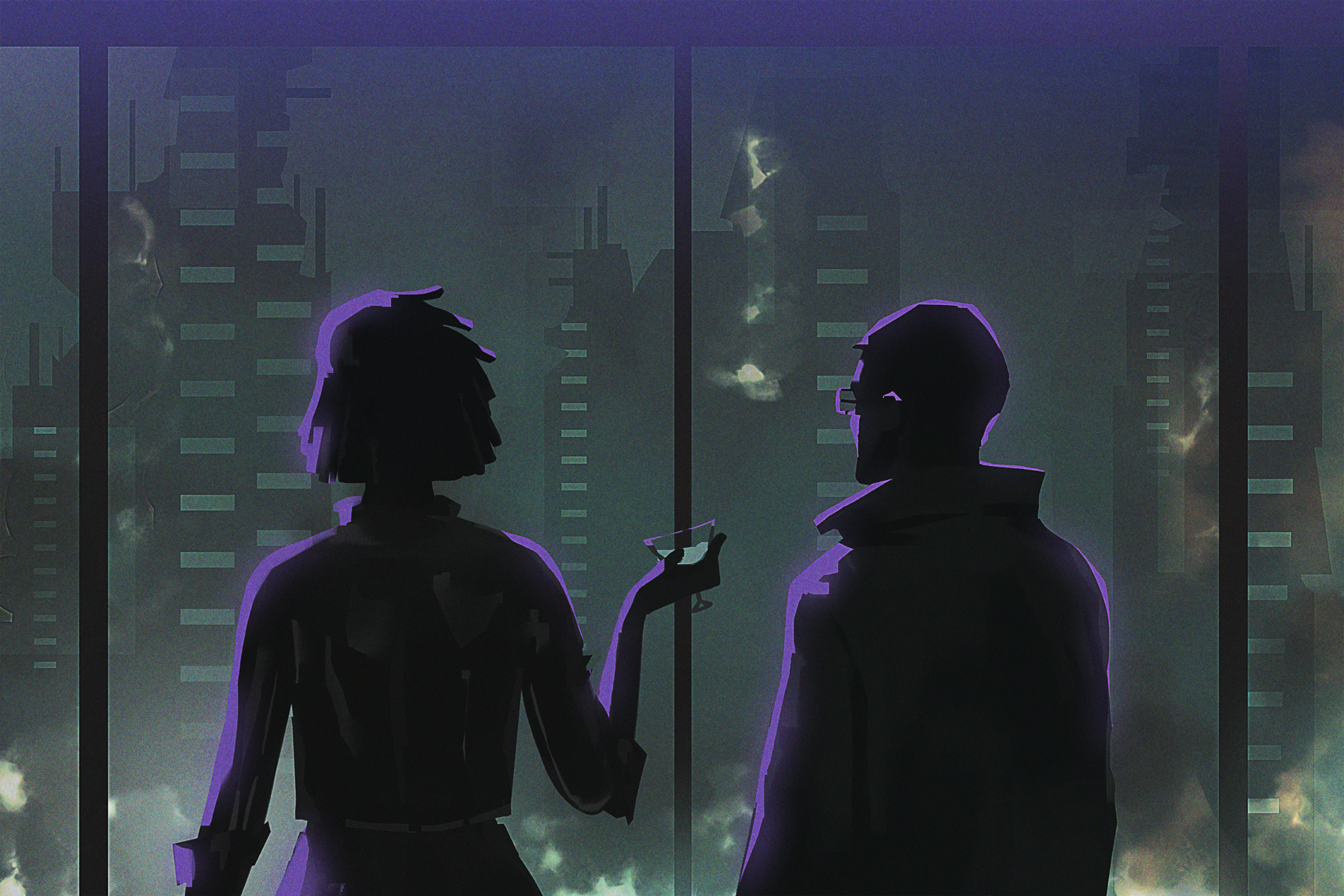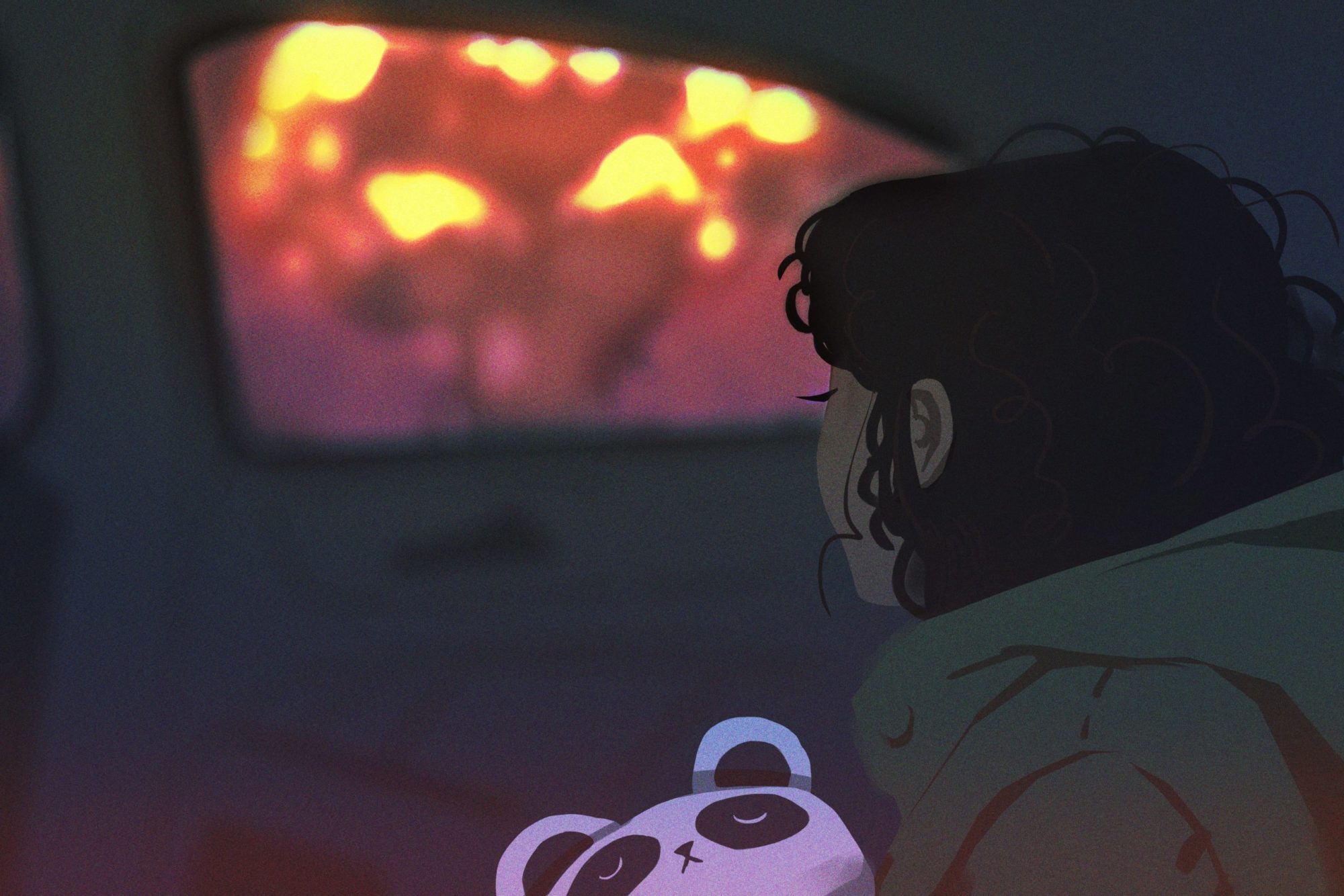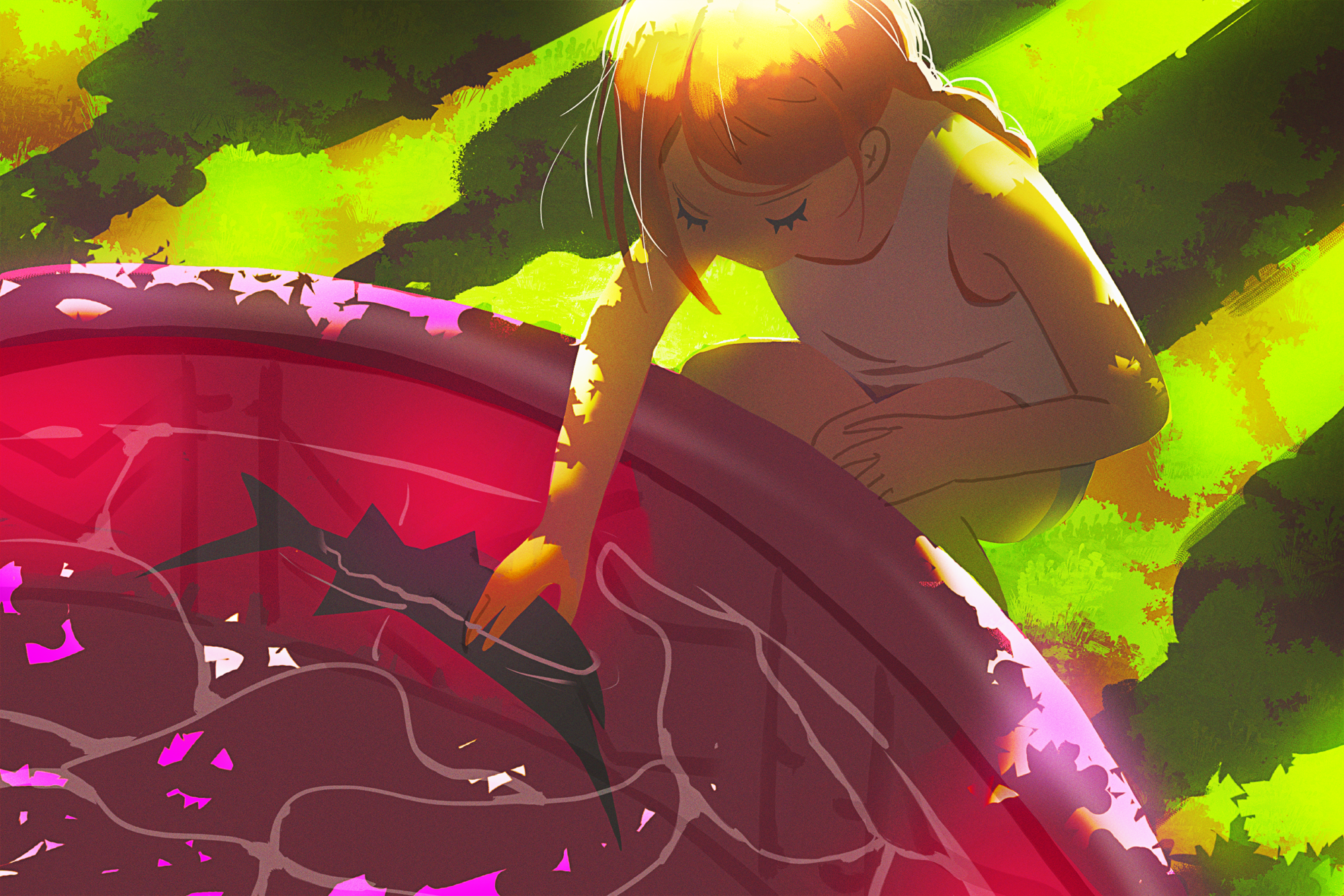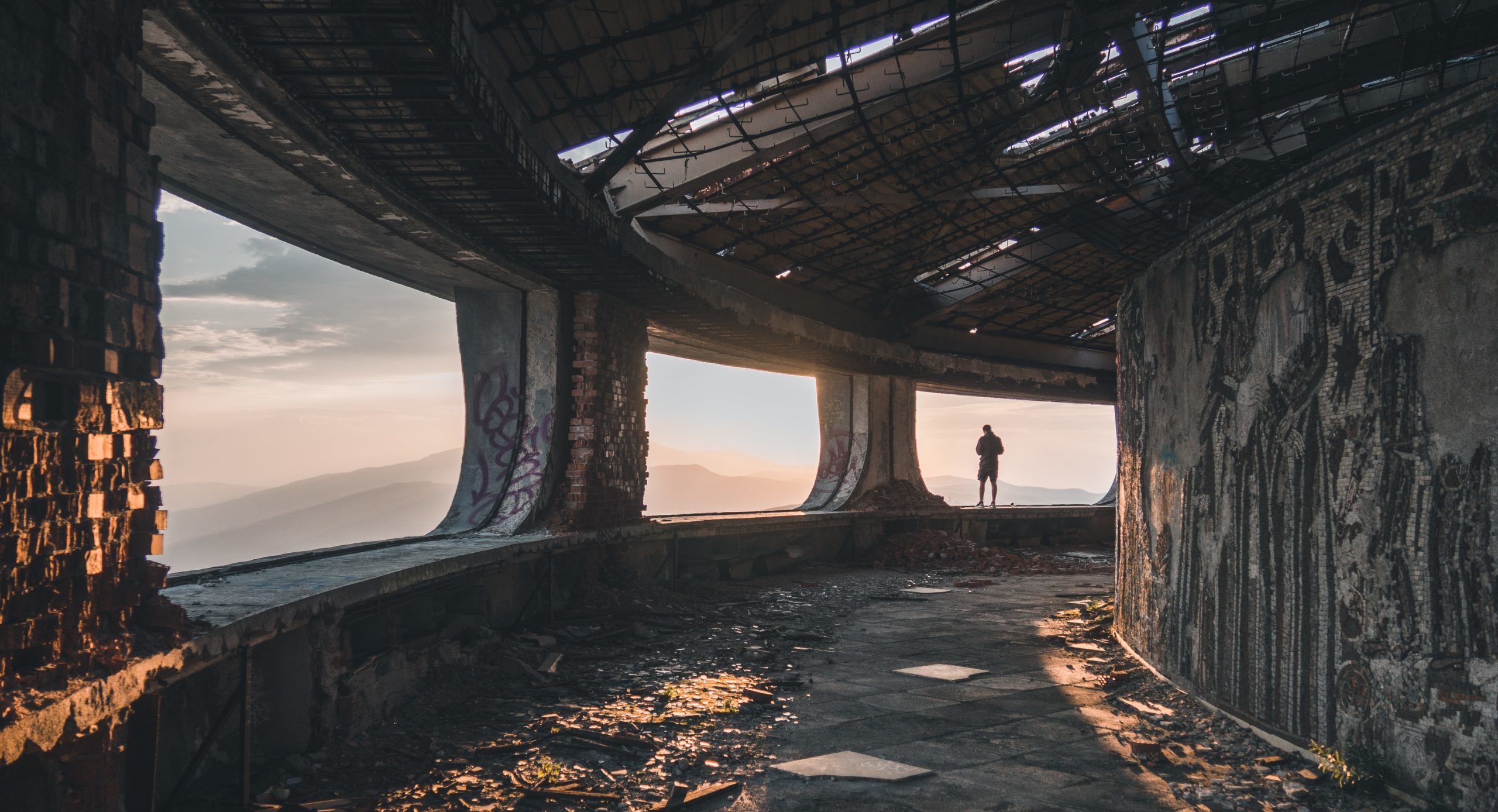In our first-ever short story contest, we invited writers to imagine an event, conflict, or situation that could make us care about — and fear — nuclear weapons again. “Destroyer of Worlds” is our third-place entry.
Brad was on his third whiskey when his watch beeped. Five minutes remaining. He silenced the alarm and stared into his glass. The whiskey was a bad idea. If anything went wrong, they would call him.
Suddenly antsy, he clambered out of the chair and surveyed the skyline through his plate glass window. From his hilltop home, he could see dozens of moonlit rooftops to the east. He imagined the neighborhood coming apart, a hot gale shearing the roofs clean from the houses, the walls leaning as if in a hurricane, windows shattering for miles. A murderous rain of glass and nails and splintered wood would rip through the night sky.
That was all he saw anymore — the precise way civilization could come apart. He pictured it with an engineer’s eye, down to every stud and joint.
With one minute remaining, he felt an urge to vomit.
He was glad Catherine, his wife, was gone. A fortuitous trip with girlfriends. Down the hall, behind her closed door, Nicole laughed at some joke with her friends.
He should tell his daughter to log out. But if he did… no. He couldn’t.
Brad closed his eyes.
Nicole’s scream made him jerk in his seat. Whiskey sloshed down both his hands.
“Nicole?”
The whiskey glass shattered on the hardwood floor, but he was already halfway down the hall.
That was all he saw anymore — the precise way civilization could come apart. He pictured it with an engineer’s eye, down to every stud and joint.
He found his daughter backpedaling in her bed, cramming herself into the corner, shaking her hands in front of her face, as if she had she’d just shaken off a tarantula.
“Oh my God… oh my God…” she hyperventilated. She ripped her VR glasses off and hurled them across her bedroom, gasping for air.
Brad took her by the arms. “What’s wrong? What happened?”
“I don’t know,” she gasped. Tears ran down her face. “They melted. They just… melted.”
“Let me take a look.”
He slipped on her glasses. The screens were black except for a floating hologram of a red skull and crossbones.
“I thought you couldn’t die in Fantastika.”
“You can’t.” She took the glasses from him. “This can’t be right. I’ve never seen this.”
“Let me try mine.”
Brad returned with his own glasses and slipped them on, entering the virtual world.
He stood in a dark haze. The sky felt profoundly wrong. It was daytime in Fantastika but a filthy fog cloaked the earth. He crawled on his hands and knees through rubble, following a single flicker of orange light. His fingers closed over a white knob. It rolled under his palm and he realized with horror that it was a human skull. Not a clean, sterile skull, like on a pirate flag. This was a recent death, just now separated from its flesh. Tissue still filled its sockets, mangled and melted into something inhuman.
Brad nearly vomited in real life. He knew exactly what to expect, had lived and breathed every detail of this terror for months, but being here now, living this, knowing it had become real, made the horror immeasurably worse.
He crawled on until the skeletal remains of a wood-framed house appeared, gnawed to spindles by the shockwave and its airborne cargo of razor-sharp debris. The light he’d been following was a fire, burning at the end of a torn gas line.
“Dad, what happened?” Nicole’s voice penetrated the artificial world.
Brad’s avatar grew ill, staggered, and died within minutes. Radiation from the nuclear blast, he knew, although most players would not grasp that. Not until later, as they gathered in online forums to piece together what happened.
Brad took off his glasses. “Let’s get some air.”
He steered Nicole through the living room to the patio, studiously avoiding the shards of his whiskey glass.
“It was like a nuclear bomb went off,” Nicole said. “Why would someone nuke a virtual world?”
“I don’t know.”
The lie tasted bitter. Brad had studied nuclear detonations for a year. He had visited Hiroshima and Nagasaki. He’d watched grainy footage of nuclear tests and pored over Japanese memoirs. He’d played with mathematical models of thermonuclear blasts, studying the physics, melding them with the physics engine in a small, sandboxed version of Fantastika. He saw thermonuclear blasts in his sleep and tasted ash in the mornings.
He went inside to check his phone. He had five missed calls, mostly from his employees, and a string of texts. The most recent was from Cassie.
Well done, it said.
I.
After Nicole went to bed, Brad put on his glasses and loaded up an alternate avatar Cassie had created for him.
He found himself aboard Cassie’s airship. The gondola was glass on every side. Strips of mood lighting cast a faint purple glow. Cassie stood at the window, her avatar fashioned with black leather, piercings, and tattoos, holding a martini glass filled with luminescent blue liquid. Brad wondered what she looked like in real life.
“You’re late,” she said.
“My daughter was in the blast.”
“Is she okay?”
Brad answered her with grim silence. He joined Cassie at the window. Far below, he examined the wounded earth. The ring of devastation stretched nearly to the horizon in every direction. The entire city had been flattened. Fires burned throughout.
He joined Cassie at the window. Far below, he examined the wounded earth. The ring of devastation stretched nearly to the horizon in every direction.
“I can’t even tell which city we’re over.”
“Gallantry. Well, what’s left of it.”
“How many bombs?”
“Eight. One in each zone capital. Your artistry was superb.”
“I can’t believe you didn’t crash the servers.”
“The load balancers and autoscaling worked fine.”
The simulation was the most computationally intensive thing Brad and his team had ever designed, and that was just one bomb. The explosion needed to propagate outward at over 300 meters per second, ranging for kilometers. It was all physics-based, which meant recomputing millions of vertices 60 times per second: searing shockwaves propelling torched skeletons through the air like rag dolls, buildings shearing and splintering in violent cascades.
“You’re tense,” Cassie said. “Have a drink.”
“I never saw the point in virtual drinks.”
A somber silence hung over them as they looked down on the apocalypse.
After a few minutes, Brad said, “You lied to me.”
“It was a contract job. You built the model to specification.”
“You should have told me you were going to deploy it.”
“I did.”
“Three hours ago! You told me this was to support nuclear nonproliferation.”
“It is,” she snapped.
“Maybe it’s time I introduced myself,” a gravelly voice said from the shadows.
Brad started. He had thought they were alone.
A figure in a wheelchair rolled out of the shadows at the far end of the gondola. He was old, hunched, and frail, peering at them through horn-rimmed glasses. Unruly white hair ringed his spotted bald head. It was an unlikely avatar — unless it reflected his real appearance.
“Tom Freeman,” the man said.
Brad searched his memory and blinked, turning to Cassie. “Why is a famous nuclear scientist in your gondola?”
“Because,” Cassie said, “he’s our benefactor.”
II.
Reporters struggled to report the story. Thermonuclear weapons had detonated in the eight megacities in a virtual world called Fantastika. Five million avatars were — dead? Deleted? No one knew if the accounts could be retrieved. Other avatars were dying of radiation poisoning, which nobody had known was modeled into the game. Fantastika launched an internal investigation but remained tight-lipped.
With a player base of over 90 million users in the US alone, the attack hit a national nerve. Even the near-nuclear exchange with China two years ago had not come close to this. But then, that was precisely the point. That was why, Freeman told him in the gondola, he felt compelled to take more drastic measures.
“The world was forgetting,” he had rasped. “Now, they cannot forget.”
On the news, teenagers and adults wept as they described being caught up in the blast. Schools brought in trauma counselors. Businessmen who profited from in-game commerce watched their profits wiped out overnight. The price of Fantastika’s in-game currency crashed, prompting a global selloff that only tightened the death spiral. The news reported suicides linked to the game.
Brad watched it all unfold with horror.
He texted Cassie: Keep Freeman’s damn money.
III.
On the third morning, Freeman tweeted a brief statement that set the Internet ablaze: I am responsible for the attack on Fantastika. He would hold a livestream at 9 p.m. Eastern.
Fifty million people tuned in, Brad and Nicole among them. Freeman sat in his wheelchair before rows of bookcases, looking exactly like his avatar.
“I know the world wants answers,” he said. “I will give them. But first, I must tell you a story.”
Freeman spoke of working for Bobby Kennedy during the Cuban Missile Crisis. He described the alternating numbness and fiery emotional outbursts in the Situation Room, as a small group of people — painfully conscious of their own inadequacy and dwarfed by the immensity of the challenge before them — sought to save the human race from nuclear annihilation. Those 13 days changed the professor’s life, scarred him beyond reckoning, and shaped the trajectory of his life. He dedicated his life to the eradication of nuclear weapons, a vile evil unlike any the human race had constructed or even conceived of… and an evil that had slipped from human consciousness as Hiroshima and Nagasaki receded into history.
“The world was forgetting,” he had rasped. “Now, they cannot forget.”
“My friends, this evil is still among us,” he said. “We have come so close to the annihilation of our species, not just once, but multiple times. My friends, if we forget the stakes, we invite our own doom.”
Freeman took off his glasses and looked straight into the camera. “My methods are unorthodox. I have tried everything else. I speak around the world. I counsel world leaders. I have produced books, films, even graphic novels. I have led workshops and crisis simulations. I do not know how else to reach this world, except to fully embrace my role as a prophet of doom. I am old. I have nothing left to lose but my reputation, and I gladly lay it upon the altar. The clock is ticking. Stand against this great evil. Ask your leaders in government to do the same.”
In the days that followed, Freeman’s press conference launched a national debate unlike any Brad had ever seen. Experts discussed how nuclear attacks would play out in real-world cities while advocates circulated petitions. Books about the Manhattan Project, the Cuban Missile Crisis, and the China standoff soared to the top of bestseller charts.
But by the end of that first week, rage at Freeman drowned the coverage, submerging every trace of concern about nuclear weapons. Freeman was a criminal, the world insisted, who had done grave damage, measured in both dollars and lives.
Fantastika went on a warpath against Freeman for his “cyber-hacking.” Criminal charges were filed against Freeman and Cassie Harrington, one of Fantastika’s many contractors. Multiple lawsuits targeted Fantastika. The Securities and Exchange Commission got involved, given the size of Fantastika’s virtual economy. Fantastika promised to restore a complete world backup, but this introduced new problems, given the volatile in-game trading since the explosion which had made hundreds of speculators rich. Even many ordinary players were upset, given the hundreds of in-game hours they had logged since the attack, banding together to form tight-knit survival communities. Some players tearfully described these days as the most meaningful of their lives. A judge blocked the backup restoration.
A rumor emerged that Russia was behind the attack. Politicians ran with it, citing Freeman’s long-running ties with Russian negotiators. Russia, they claimed, was trying to frighten Americans into making cowardly concessions instead of boldly expanding America’s nuclear arsenal. It was ridiculous to worry about these phantom threats of nuclear annihilation, when Americans faced a real enemy who showed no reluctance to sow destruction and chaos in cyberspace. In the next session of Congress, lawmakers voted to triple investment in nuclear weapon modernization and development.
IV.
Brad scarcely left his home. He watched the news, browsed social media, and roamed the wreckage of Fantastika like a ghost. It was only a matter of time before the FBI uncovered his role as a subcontractor to Cassie’s company. He hadn’t bothered to hide his tracks. He had no idea how this would end in anything but jail.
Catherine would return home tomorrow. What would he tell her?
That night, he sat with Nicole on their patio.
“Why’d you do it, dad?”
“Do what?”
She gave him a sharp look. “It took me a day or two, but I figured it out. You’re, like, one of the best video game designers in the world. All this secrecy over the past year. And I checked your phone. I saw the messages with Cassie.”
Her voice trembled. She looked at him with the pain of betrayal.
How could he possibly explain?
“I’m sorry, kiddo.”
She bit her lip and shook her head slowly, holding back her tears.
“It was so horrible. My friends — everything we’d built together. You destroyed a world.”
“Yes,” he whispered hoarsely. “I suppose I did.”
Nadaskii is an illustrator. You will be able to purchase this work as a print and view her other work here.




















